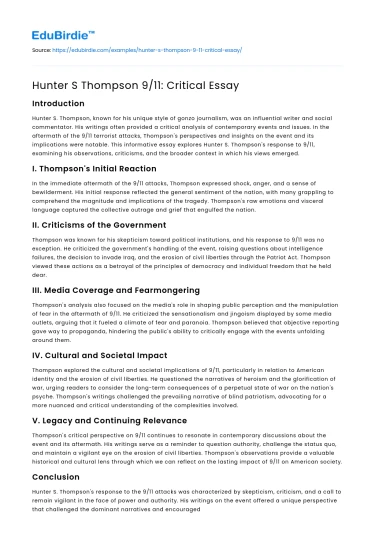Introduction
Hunter S. Thompson, known for his unique style of gonzo journalism, was an influential writer and social commentator. His writings often provided a critical analysis of contemporary events and issues. In the aftermath of the 9/11 terrorist attacks, Thompson's perspectives and insights on the event and its implications were notable. This informative essay explores Hunter S. Thompson's response to 9/11, examining his observations, criticisms, and the broader context in which his views emerged.
I. Thompson's Initial Reaction
In the immediate aftermath of the 9/11 attacks, Thompson expressed shock, anger, and a sense of bewilderment. His initial response reflected the general sentiment of the nation, with many grappling to comprehend the magnitude and implications of the tragedy. Thompson's raw emotions and visceral language captured the collective outrage and grief that engulfed the nation.
Save your time!
We can take care of your essay
- Proper editing and formatting
- Free revision, title page, and bibliography
- Flexible prices and money-back guarantee
II. Criticisms of the Government
Thompson was known for his skepticism toward political institutions, and his response to 9/11 was no exception. He criticized the government's handling of the event, raising questions about intelligence failures, the decision to invade Iraq, and the erosion of civil liberties through the Patriot Act. Thompson viewed these actions as a betrayal of the principles of democracy and individual freedom that he held dear.
III. Media Coverage and Fearmongering
Thompson's analysis also focused on the media's role in shaping public perception and the manipulation of fear in the aftermath of 9/11. He criticized the sensationalism and jingoism displayed by some media outlets, arguing that it fueled a climate of fear and paranoia. Thompson believed that objective reporting gave way to propaganda, hindering the public's ability to critically engage with the events unfolding around them.
IV. Cultural and Societal Impact
Thompson explored the cultural and societal implications of 9/11, particularly in relation to American identity and the erosion of civil liberties. He questioned the narratives of heroism and the glorification of war, urging readers to consider the long-term consequences of a perpetual state of war on the nation's psyche. Thompson's writings challenged the prevailing narrative of blind patriotism, advocating for a more nuanced and critical understanding of the complexities involved.
V. Legacy and Continuing Relevance
Thompson's critical perspective on 9/11 continues to resonate in contemporary discussions about the event and its aftermath. His writings serve as a reminder to question authority, challenge the status quo, and maintain a vigilant eye on the erosion of civil liberties. Thompson's observations provide a valuable historical and cultural lens through which we can reflect on the lasting impact of 9/11 on American society.
Conclusion
Hunter S. Thompson's response to the 9/11 attacks was characterized by skepticism, criticism, and a call to remain vigilant in the face of power and authority. His writings on the event offered a unique perspective that challenged the dominant narratives and encouraged readers to engage critically with the complexities of the post-9/11 world. Thompson's legacy as a social commentator and writer continues to inspire readers to question, analyze, and challenge prevailing beliefs, ensuring that the lessons and discussions prompted by 9/11 remain relevant and thought-provoking.






 Stuck on your essay?
Stuck on your essay?

